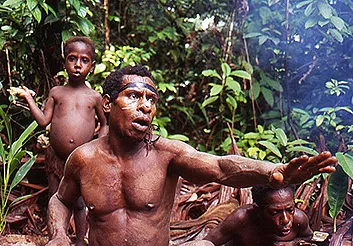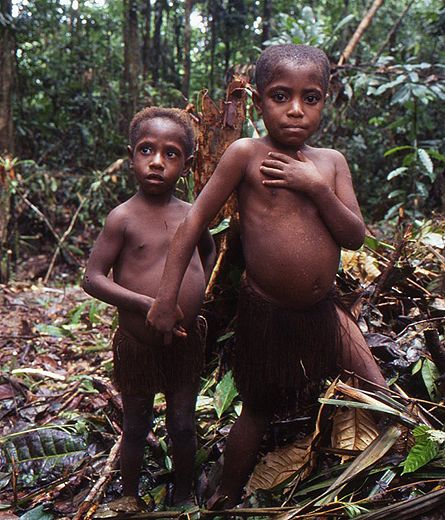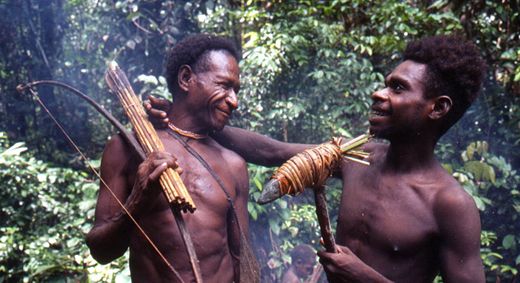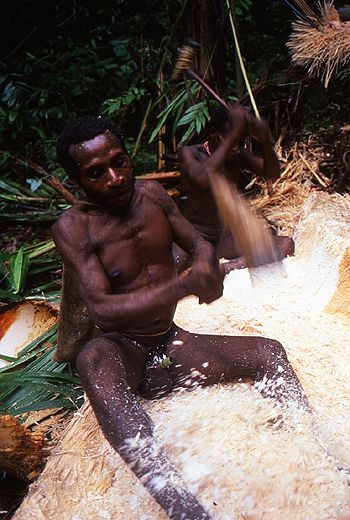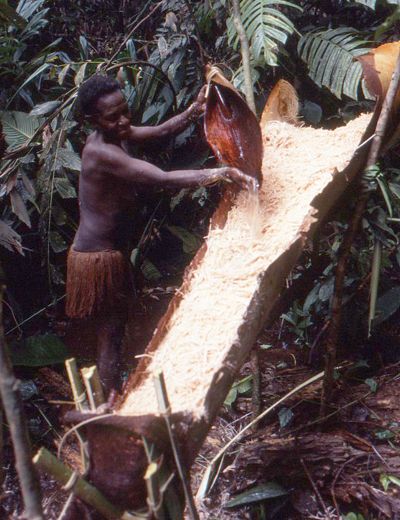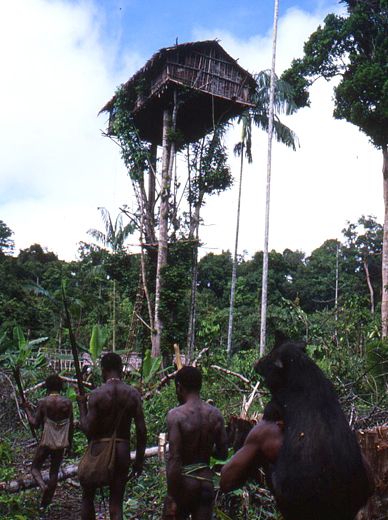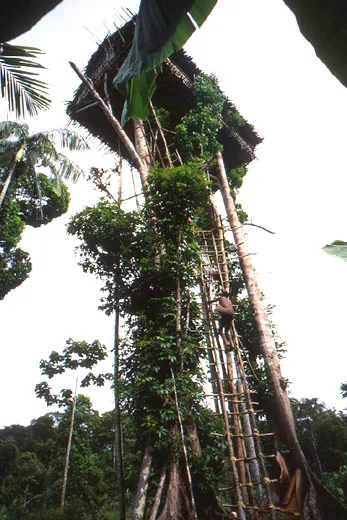Raffaele Among the Korowai
Paul Raffaele describes his adventures (and misadventures) in Indonesian New Guinea, reporting on the Korowai
/https://tf-cmsv2-smithsonianmag-media.s3.amazonaws.com/filer/raffaele_main.jpg)
Paul Raffaele, who lives in Sydney, Australia, has written many stories for SMITHSONIAN, on subjects from child warriors in Uganda to Australian killer jellyfish. In April, he ventured to Indonesian New Guinea to write about the Korowai, believed to be one of the last tribes of cannibals in the world. In the emails that follow, Paul describes his adventures, and misadventures reporting this story to SMITHSONIAN editor Carey Winfrey. Raffaele begins by assuring Winfrey that an infection he picked up in New Guinea is nothing to worry too much about.
The whole story, “Sleeping with Cannibals” is in the September, 2006, issue of SMITHSONIAN magazine.
April 25th, 2006
Paul: I didn't mention the mess on my arm to you because I didn't want you to worry. It's Ok, no pain, and if it's not cleared up by Monday the doctor is sending me to the School of Tropical medicine here in Sydney.
The worst of it is that the doctor says the infection has become deeply set in my body, so that when I've got a scratch that, too, resists Betadine and becomes infected. It is this, he says, that's causing gas to form in my stomach, blowing it up to the shape of a soccer ball. The distension causes a lot of pain, like a knife in the guts, and it lasts a few hours before it goes down for an hour or so and then blows up again, and once again hurts like hell. So, the past few days I've either been trying to escape through sleep or dozing and feeling forlorn, but he has me on a strong antibiotic specifically for skin infections and I know that in a few days I'll be Ok, and so I'm not worried.
As I've mentioned before, this comes with the territory. I feel blessed because I seem to have an immunity to malaria, and all this other stuff is minor league in comparison. Sydney Possuelo, in Brazil, has had malaria 39 times and carries pills in a capsule around his neck to take whenever he gets an attack. David Greer in Dzanga-Sangha is one of the toughest blokes I've ever met, he runs through the jungle with the pygmies clad in shorts, no shirt and no shoes. And yet I saw him curl up within himself with the pain in the darkness of his room, oblivious to the world, when he got yet another attack of malaria while I was there for a story.
So, I'm fine by comparison.
April 25th, 2006
Carey: You're a tough bird, I'll admit; still, at our age, we have to be more careful than we were when we were a few decades younger. I'm sure [a mutual friend] mentioned your infection but in fact it didn't really register on my addled brain. I thought he was merely--well, hardly merely--referring to your scabies problem. In any case, I hope the antibiotics work; this is nothing to take lightly.
April 25th, 2006
Paul: Thanks mate. I'm up reading, first time in days. This afternoon, the antibiotics seem to have kicked in, the arm seems to be healing quite well and I've been spared the terrors of 'soccer ball stomach' for some hours. The scabies has also cleared up, and so once again I seem to have escaped the horrors of the jungle. Maybe I should go looking for a desert for the next story.
Truly, I don't take the nasties of the jungle lightly, and that's why I always go there armed with a solid medical pack. That said, you have to take some risks in these places. Very few Korowai ever get to meet their grandparents, because the grandparents are usually dead by the time they're born, either from warfare or disease. The prevalence of disease in the jungle forms the basis of the khahkua cannibal cult, a Stone Age rationale for death by disease. The Korowai believe death is caused by a sorcerer, called a khahkua. The khahkua is killed and eaten in revenge—payback is one of the dominant cultural imperatives in most Melanesian cultures.
April 25th, 2006
Carey: It's going to be an amazing story.
May 3rd, 2006
Paul: It's evening and I'm about to begin writing the Korowai story. I apologise for taking so long to start, but I've been through mini-hell the past sixteen days, though nowhere near as bad as hell in the jungle. Because I'm still not 100% OK, I'll probably restrict the writing to about four hours a day, as against my usual eight to ten, and that means I won't have the finished first draft to you until the Friday after next, 12th May. I'm raring to go, and so I'll be fine.
There have been other Korowai stories, but I can assure you that this one will be way out ahead of them. I did a Korowai story for Reader's Digest in 1996. But, this one is many times better because I go into up-river territory my Korowai guide would not take me into last time for fear of our being killed. This time I had a peerless guide, and Korowai porters and boatmen all armed with bows and arrows.
I learned yesterday that my guide has tested positive to amoebic dysentery, and my doctor today thinks that might be the clue to the dizziness, bloated stomach and diarrhea I've been suffering from since my return. Better I find out now if it’s dysentery because the bloody thing can be really dangerous if you don't know about it and the months pass. I'm told it's relatively easy to cure.
All things considered, I've got off relatively lightly once more. I'm not fussed because I can't think of a worse jungle for disease, etc, than the one I've just come out of, but somewhere down the track if I have to go into such a place again to get a story like this one then who am I to say no.
May 4, 2006
Carey: That all sounds good, Paul, except for the part about amoebic dysentery and its various effects. Just remember that as far as we're concerned, your health is more important than any deadlines.
May 4, 2006
Paul: It's 0400 and I'm up writing. My schedule has me finishing the cannibals at the latest in mid May.
Thanks for thinking of my health. My morbid humor caused me a wry smile when I saw, 'deadlines'. This presently is a minor blip, inconvenient but bearable and treatable, and if I find that I do have amoebic dysentery, then the cure is pretty swift. I'm taking another type of antibiotic, starting yesterday, for the lingering tropical infection in my blood and that should be gone soon enough. All this increases enormously my admiration and respect for the great explorers of Africa, New Guinea, etc. A favourite book is Richard Burton's Africa journal in his and John Speke's search for the source of the Nile, and what that man endured during his explorations makes whatever I've got now like a pimple.
May 4, 2006
Paul: In the grand tradition in which we were raised as kids, with serials on Saturday afternoon at the movies (“Jungle Jim” etc) hinting in previews at what's to come the following week, here is the opening to the cannibal story.
Hope it whets your appetite.
THE KHAHKUA EATERS
A Journey Into The Land Of The Cannibals
By Paul Raffaele
For days I have been slogging through a remote rain-soaked jungle in Indonesian New Guinea, on a quest to visit the last cannibal tribe on earth, the feared Korowai, a stone age people who perch in high treehouses and enjoy eating human flesh. That morning I boarded a pirogue, a big canoe hacked out of a tree trunk, for the last and most dangerous stage of the journey, along the twisting Ndeiram Kabur river. Now, at mid-evening, the four paddlers bend their backs with vigor, knowing we will soon make camp for the night.
My guide, Kornelius Sembering, knows the Korowai well, but even he has never been this far up river, aware that some clans up here threaten to kill outsiders who dare enter their territory. They especially fear and hate those of us with pale skins, even though none have ever seen white people. They call us, ‘laleo’ or ‘ghost-demon,’ warned of our presence beyond their jungles by age-old prophetic campfire tales.
Suddenly, from around the bend a terrifying sound erupts, frenzied screaming and yelling. Moments later, through the gloom I see a throng of naked men on the river bank brandishing bows and arrows at us. Kornelius murmurs to the boatmen to stop paddling. “They¹re ordering us to come to their side of the river,” he whispers to me. “It looks bad, but we can’t escape, they’d quickly catch us if we tried.”
My heart thuds as I peer at the shadowy tribesmen, their uproar banging at my ears now they see us. Our pirogue nudges the far side of the river as Kornelius tries to reason with them, shouting across the water. Then, a pair of tribesmen slip into a pirogue and paddle towards us. As they near I see they carry bows and barbed arrows. “Keep calm,” Kornelius says softly. “If we panic or make a false move, we’ll be in serious trouble. Our boatmen say they¹d kill us.”
Line space
May 4, 2006
Carey: I’ll say it whets my appetite! What happens next? Do you survive? Excuse me while I go get some popcorn.
May 4, 2006
Paul: The question whether I survive or not is still open. We should know by this time next week, next episode.
I’m off to bed, it’s 0600.
May 4, 2006
Carey: Well I, for one, am hoping that you do survive. Sweet dreams.
May 5, 2006
Paul: Just heard that my guide now has hookworm confirmed, as well as the amoebic dysentery. So my dutiful daughter has just gone out to get Comatrin for me to take as a precaution. I would not be surprised if he lets me know in a day or two that he's just been confirmed with leprosy and that I should go get checked.
The good news is that I'm really enjoying the writing, shrugging off all the woes, as I relive my greatest ever adventure. I expect to have it written, revised and sent to you by Monday -- Tuesday at the latest.
May 6, 2006
Carey: Glad to hear that you're enjoying the writing and that it's going well. And while we're all looking forward to reading your greatest adventure ever, we continue to worry about your health and urge you to make that your very highest priority. These exotic diseases are nothing to take lightly, even by an old Light Brigadier such as yourself.
May 6, 2006
Paul: I'm up writing, 3,500 words into the story, presently quoting one of the khahkua killers, Bailom, about how he killed one of his friends after he was identified as a khahkua, shooting him full of arrows, and how the body was then cut up in a ritual way for sharing out among the families. I have a shot of Bailom and his very scary brother, Kili-kili, the Korowai's greatest khahkua killer, with the skull of their latest victim.
Thanks for the concern. I'm very careful and am not taking the bugs lightly.I've been to my doctor a number of times since arriving home, have tested for amoebic dysentery ( the results on Monday ) and this evening took a full dose of antibiotic which will knock out any hookworms present. He's not felt it necessary yet to send me to the School of Tropical Medicine and so we're making progress. I feel much better today, no dizziness or diarrhea (whoopee), and that's why I'm steaming along with the writing.
As SMITHSONIAN was preparing Paul’s article about the cannibals for publication in July, Raffaele was on assignment for us in Pakistan. Alerted to the need to answer some questions, Paul checked in from Pakistan.
July 13, 2006
Paul: I just arrived in Gilgit [Pakistan], out of email contact for many days. Going to Hunza in a few hours for the final leg of a story which is a beauty. The mad wild polo game at 12,500 feet was the greatest in the history of the event. The sub themes are great too.
Lyn has emailed me that you're planning cannibals for September and that she needs the fact-checking done by the end of the month. I'm presently a few days ahead of schedule and am booked out of Islamabad on the 18th to Hong Kong, but because it's school holidays all the flights to Sydney are booked out solidly until the 26th when I have a confirmed booking. That's too late for the fact-checking, and I can't do it from Hong Kong because I don't have the materials.
What I suggest is that I finish up here by the 16th, as planned, and then get a new ticket from Islamabad to Sydney. I'm currently under my travel budget, and can use this to pay for the air ticket presuming that I can get one that cheap which I can, perhaps flying through Bombay and Singapore to Sydney.
That would get me home about the 20th with time to get the material to Lyn and answer any questions.
July 13, 2006
Carey: that sounds like a good plan to me. In the meantime (ie before the 20th), even though you don't have all the materials, you may be able to answer many of our questions from memory, so let's stay as much in touch as possible by whatever means possible. Also, I'd love to get, asap, a high-resolution copy of that photo of you dancing with the fierce man (name escapes me at the moment) taken by the translator, to include in the layout. Glad to hear that the polo went well.
July 16, 2006
Paul: The Pakistan story has gone well and I ended it today. But I had a weird accident today at Hunza. There are five trillion rocks up there among the snow giants and I slipped on one this morning. I pitched forward and slammed my head into a big rock on the ground. I didn't as much as touch my nose or my teeth, but my forehead took the impact and my forehead spilt open from just above the bridge of the nose to about half an inch into the hairline. They rushed me to a clinic where a medical assistant put in ten stitches in a vertical line connecting the spots mentioned. It looks ghastly, as if I'm Frankenstein, but if you walk the tightrope enough then one day you'll fall off. My daughter says they do wonders with laser these days, so maybe the scar won't be so dreadful. My skull is fine, and I have had no pain in my head. The doctor who checked said I have a thick skull. You might agree with him. I'll have a cat scan when I get home just to make sure. It's the sort of accident you can have at home working in the garden.
Otherwise, all is well. I'll be home the morning of the 21st and will fax the field journal to Lyn the same day so that it's on her desk when she gets in.
